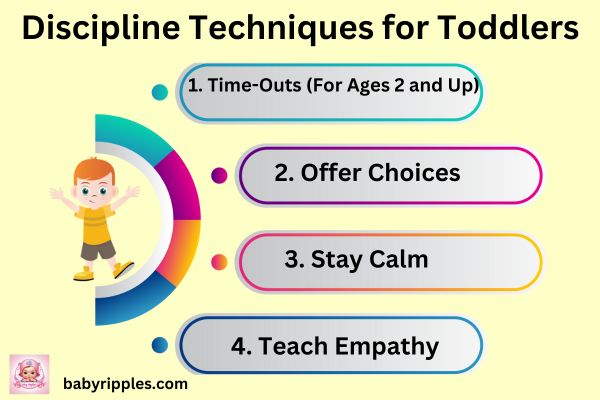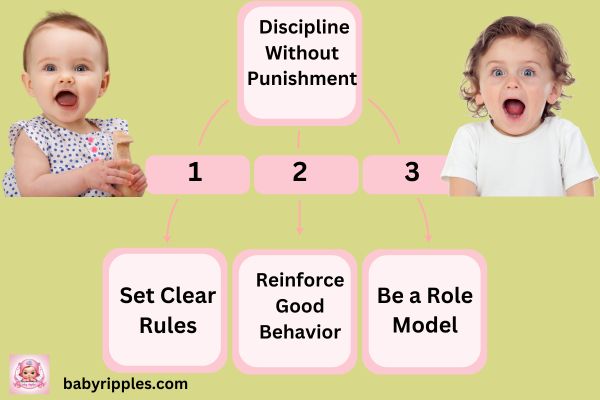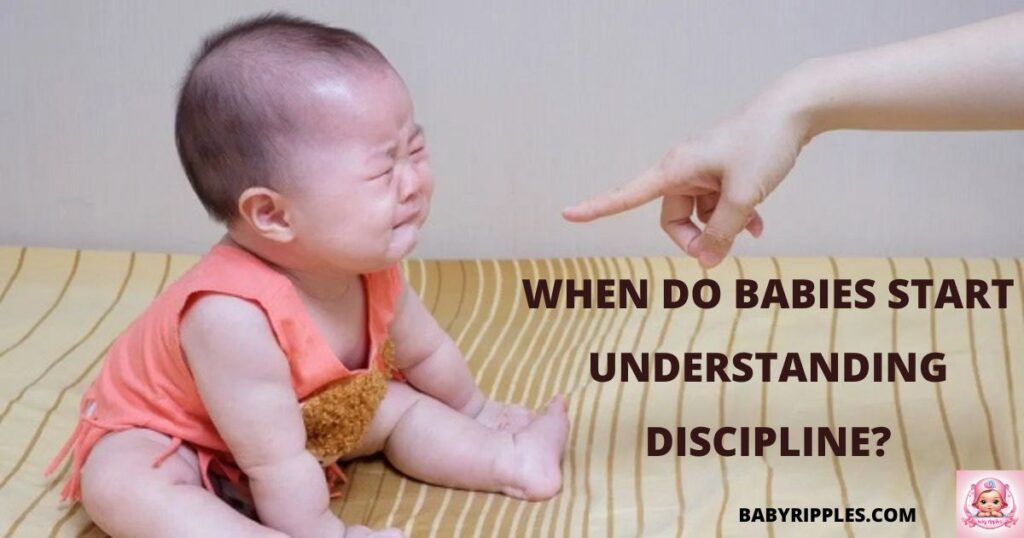A child’s upbringing requires discipline. It establishes the groundwork for teaching kids responsibility, respect, and self-control. When do babies start understanding discipline? This is a question that many parents have. Since beginning discipline at the appropriate period can have a long-lasting effect on their growth, it’s an important question. With step-by-step guidance specifically designed for parents, this guide will examine when to start and how to make it effective.
You may want to read : What Is a Velcro Baby
- Understanding Discipline in Early Development
- When Do Babies Start to Understand Discipline?
- Signs Your Baby is Ready for Discipline
- When to Start Disciplining Your Toddler
- Effective Strategies for Early Discipline
- When Should I Start to Discipline My Toddler?
- Discipline Techniques for Toddlers
- How to Discipline Without Punishment
- Common Mistakes Parents Should Avoid
- Final Thoughts on Early Discipline
- FAQs about when do babies start understanding discipline
Understanding Discipline in Early Development
As early as 6 to 9 months of age, babies start to grasp the fundamentals of cause and consequence. This is when they begin to link their actions to results, even though they don’t understand “discipline” in the conventional sense. For instance, a toy that is thrown falls. The foundation for a subsequent comprehension of behavior and consequences is laid by these early experiences.
When Do Babies Start to Understand Discipline?
Discipline principles are usually first understood by babies between the ages of 12 and 18 months. At this point, their emotional and cognitive capacities are sufficiently matured to enable children to make a deeper connection between acts and results. Toddlers can begin to understand basic rules and boundaries, while their comprehension is still restricted.
Signs Your Baby is Ready for Discipline

- They begin testing limits, like throwing food or toys repeatedly.
- They show understanding of simple instructions like “stop” or “no.”
- They respond to facial expressions and tone of voice.
When to Start Disciplining Your Toddler
Experts recommend starting discipline as soon as your child begins to show signs of testing limits, usually around 12 months old. At this stage, discipline isn’t about punishment but teaching. Use gentle guidance to help them understand what’s acceptable and what isn’t.
Effective Strategies for Early Discipline
1. Create a Safe Environment
Babies are naturally curious, so instead of constantly saying “no,” create a space where they can explore safely. This reduces frustration for both the parent and the baby.
2. Use Redirection
Redirection is an excellent tool for babies. If they’re playing with something they shouldn’t, calmly guide them toward a safer alternative. For instance, replace a sharp object with a soft toy.
3. Be Consistent
Consistency is key to helping babies understand discipline. If you set a boundary, stick to it. Mixed signals can confuse your baby and make it harder for them to learn.
4. Focus on Positive Reinforcement
Praise your baby for good behavior. For example, if they put away their toys, offer verbal encouragement like, “Good job!” Positive reinforcement helps babies associate good behavior with rewards.
5. Use Simple Language
Use short and clear phrases like “no touch” or “hot” to communicate effectively. Babies are more likely to understand and remember concise instructions.
When Should I Start to Discipline My Toddler?
As your child enters toddlerhood, discipline becomes more organized (18-24 months). At this point, they have a more acute awareness of right and wrong. Simple guidelines and age-appropriate penalties can be implemented.
Discipline Techniques for Toddlers

1. Time-Outs (For Ages 2 and Up)
A brief time-out (1 minute per year of age) can be an effective way to teach toddlers about consequences. Make sure to explain why they’re in a time-out calmly and without anger.
2. Offer Choices
Giving toddlers simple choices, like “Do you want to clean up the toys now or after your story?”, helps them feel in control while learning responsibility.
3. Stay Calm
Toddlers are highly emotional, and yelling can escalate the situation. Stay calm and assertive when addressing misbehavior.
4. Teach Empathy
Encourage your toddler to understand the impact of their actions on others. For example, if they hit a sibling, explain how it made their sibling feel sad.
How to Discipline Without Punishment

Discipline doesn’t always mean punishment. It’s about teaching your child the difference between acceptable and unacceptable behavior. Here are some gentle methods:
- Set Clear Rules: Ensure your baby or toddler knows what is expected.
- Reinforce Good Behavior: Use stickers, hugs, or verbal praise.
- Be a Role Model: Show the behavior you want your child to emulate.
Common Mistakes Parents Should Avoid
- Being Inconsistent: Children thrive on routine and consistency.
- Overusing “No”: Use it sparingly to make it more impactful.
- Physical Punishment: Research shows it’s ineffective and can harm the parent-child relationship.
Final Thoughts on Early Discipline
Parenting requires discipline, but discipline is more about teaching than punishment. Your infant will develop into a well-behaved and self-assured child if you start early and use gentle, consistent techniques. You may establish a supportive atmosphere where your child flourishes by employing strategies like redirection, positive reinforcement, and open communication.
Keep in mind that the purpose of punishment is to help your child grow up to be a responsible, compassionate person. Begin modestly, maintain consistency, and observe your child develop into a well-rounded person.
FAQs about when do babies start understanding discipline
1. When do babies start to understand discipline?
Babies begin grasping basic discipline concepts around 12-18 months, depending on their cognitive and emotional development.
2. When to start disciplining toddlers?
Start disciplining toddlers as early as 12 months when they begin testing boundaries and understanding cause and effect.
3. When should I start to discipline my toddler?
Introduce simple rules and boundaries once your toddler shows signs of understanding instructions, usually around 18 months.
4. What are the best discipline techniques for toddlers?
Time-outs, redirection, and positive reinforcement are effective methods for disciplining toddlers without punishment.
5. Why is consistency important in discipline?
Consistency helps children understand boundaries and learn acceptable behavior faster, reducing confusion and frustration.





